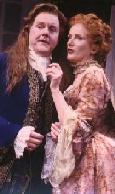SEARCH CurtainUp
TKTS
Letters to Editor
REVIEWS
FEATURES
ADDRESS BOOKS
Broadway
Off-Broadway
DC
NEWS (Etcetera)
BOOKS and CDs
(with Amazon search)
OTHER PLACES
Berkshires
DC (Washington)
London
Los Angeles
QUOTES
FILM
LINKS
MISCELLANEOUS
Free Updates
Masthead
Type too small?
NYC Weather
A CurtainUp
Review
The Way of the World
Where modesty's ill manners, 'tis but fit
That impudence and malice pass for wit. --Mirabell
 Dan Daily & Joanne Camp |
Eventually, the tide of opinion about The Way of the World shifted The play once called irrelevant and overly complicated garnered praise for its satirical wit. It became the shining example of Congreve's ability to lay bare the artificial world of the nobility which valued manners and gallantry over morality and still create thoroughly human and likeable characters like Mirabell and Millamant. And yet, while the play's reputation as a comedy of manners par excellence holds, it's not commonly found on or off Broadway. Too long for most of today's audiences short attention spans. Too large a cast to make it economically viable for most producers.
That's why the Pearl Theatre with its dedication to presenting classics true to their source warrants our thanks for making possible what's impossible in the commercial theater. Their just opened production of Congreve's play is their most ambitious venture yet since the same actors who've mastered the many parts of the scheming aristocrats and their servants but also Aeschylus' The Orestia so that they can present both in rotating repertory. Thus the classic theatrical mask of comedy will alternate with it counterpart mask of comedy.
While described as a comedy about sex and money, the emphasis is definitely on the latter which, for all the period costumes and manners, is a topic that has never stopped being timely. Mirabell (Dan Daily) and the spirited Millamant (Joanne Camp) whose at times star-crossed love story is the hub around which all the sub-plots turn have a famous scene that, though not about money matters, is equally timely as a sample behavioral pre-nup agreement.
In deference to the restraints of time and shorter attention spans of modern audiences, director Ray Virta has pruned the original four hours, leaving three hours to spin out the various webs of deceit and pretensions: Mirabell almost loses his love, by using the indirect approach to get close to her by courting her aunt Lady Wishfort (CarolSchultz). When she discovers the truth, that lady is of course angry enough to disinherit her niece (Millamant) if she marries Mirabell. To undo the harm, Mirabel now hatches a scheme to have his manservant Waitwell (Robert Hock) court Lady Wishfort under the assumed identity of Mirabell's uncle Sir Rowland. The idea is that once Lady Wishfort realizes that she's made a fool of herself over a servant, she'll be sufficiently shamed to agree to the Mirabell-Miallamant marriage.
To further safeguard his plan, Mirabell also arranges a secret marriage between Waitwell and Lady Wishfort's maid, Foible (Mikel Sarah Lambert). T here's a subplot involving Mrs. Marwood (Robin Leslie Brown) and Mr. Fainall (Jay Russell) who besides being secret lovers, pretend friends to all parties, cook up a few complications of their own -- Mrs. Marwood, revealing Mirabell's scheme to Lady Wishford in order to punish him for rejecting her and Fainall accusing his long suffering wife (Katherine Leask) of infidelity in order to get rid of her while gaining control of the family money.
From all this it's easy to see why the ways of this world were considered complicated and even Mr. Virta's cuts don't prevent the second act from sagging under the weight of its sub-plots. Still, the witty dialogue and the energetic cast of Pearl regulars and assorted guest actors, sustain our attention to the inevitable happy ending. To mention a few of the former: The booming-voiced Dan Daily is terrific as Mirabell, though his long blonde wig looks silly enough on him to be distracting. Joanne Camp is a feisty and likeable Millamant while Carol Schultz and Robin Leslie Brown once again show themselves as amusingly devious ladies of a certain age. John Wylie plays Sir Wilful Witwoud with the campy humor Pearl subscribers seem to eat up.
Particularly good among the Pearl newcomers are Jay Russell as Fainall, the villain of the piece, and Dominic Cuskern as the rouged and mincing Witwoud (half brother to Sir Wilful). They also have some of the best lines. For example, there's Fainall's description of the women's gossipy get togethers "like the coroner's inquest, to sit upon the murdered reputation of the week."
Beowulf Boritt's set design of sliding doors is adequate for moving the many characters on and off the stage, but the cardboard construction is a bit flimsy looking. Barbara A. Bell's costumes, on the other hand are gorgeous, with eye-catching tearose pinks and greens predominating.
| THE WAY OF THE WORLD
By William Congreve Directed by Ray Virta Cast: Rachel Botchan, Carl Bradford, Robin Leslie Brown, Joanne Camp, Dominic Cuskern, Dan Daily, Emily Gray, Robert Hock, Mikel Sarah Lambert, Katharine Leask, Christopher Moore, Jay Russell, Carol Schultz, Brian Turnbaugh, John Wylie Set Design: Beowulf Borritt Lighting Design: Robert Williams Costume Design: Barbara A. Bell Sound Design: Johanna Doty Movement: Alice Teirstein Running time: 3 hours, including 2 10-minute intermissions Pearl, 80 St. Mark's Pl. (1st/2nd Avs), 598-9802 3/10/2000-5/27/2000 (in alternating repertory The Oresteia); opening 3/19/2000 Reviewed by Elyse Sommer based on March 18 performance |
